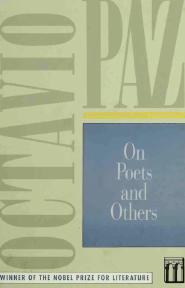On Poets and Others by Octavio Paz

Author:Octavio Paz [Paz, Octavio]
Language: eng
Format: epub, pdf
Publisher: Arcade Publishing
Published: 2014-08-05T00:00:00+00:00
In the speech he wrote accepting the 1970 Nobel Prize, Solzhenitsyn spoke a few words which can summarize what Lukács meant by socialist realism, something quite distinct from those propaganda texts disguised as novels which are not realistic and much less socialist:
Literature is the memory of peoples; it transmits from one generation to the next the irrefutable experiences of men. It preserves and enlivens the flame of a history immune to all deformation, far from every lie.
Before this strange opinion, two comments occur to me. First: since its origins in 1934 “socialist realism” has been a literary-bureaucratic dogma of Stalinism, while Solzhenitsyn, a rebel writer, is more an heir to the realism of Tolstoi and Dostoevski, profoundly Slavic and Christian. Second: even if Solzhenitsyn were a “socialist realist” who does not know he is a “socialist realist,” The Gulag Archipelago is not a novel but a work of history.
The Gulag Archipelago is not only a denunciation of the excesses of the Stalinist regime, however atrocious they may have been, but of the Soviet system itself, as it was established by Lenin and the Bolsheviks. There are two dates that form an essential part of the title of the book and its content: 1918—1956. The work extends from the origins of the Soviet system of repression (the establishment of the Cheka in 1918) to the beginning of Khrushchev’s regime. We know, moreover, that in other volumes not yet published the Russian writer concerns himself with repression in the contemporary period, that is, the period of Khrushchev and Brezhnev. Solzhenitsyn’s opinions are, of course, open to dispute. See for example Roy Medvedev’s criticism from the perspective of Marxism-Leninism. The Russian historian agrees that it would not be honest to conceal the serious errors of Lenin but thinks that those errors do not compromise entirely the Bolshevik historical project. Medvedev’s position isn’t very far from that which Merleau-Ponty and Sartre assumed in 1950, though he does not concur in the bigotry of the pious legend of the Bolsheviks (“In Lenin and Trotsky,” declared the editorial in Les temps modernes 51, “there isn’t a single word that isn’t sensible.”). Halfway between Solzhenitsyn and Medvedev we find Sakharov, the great physicist and mathematician. His condemnation of Leninism is more decisive than Medvedev’s, but in his criticism there is neither Slavophilia nor Christianity as in Solzhenitsyn’s work. Sakharov is a liberal intellectual, in the true sense of the expression, and is closer to Herzen and Turgenev than to Dostoevski and Tolstoi.
This brief description reveals the variety of the Soviet dissidents’ attitudes. A really remarkable feat is the survival—or more correctly, the continued vitality—of intellectual and spiritual currents predating the 1917 Revolution, and these, after half a century of Marxist-Leninist dictatorship, reappear and inspire men as different as the historian Andrei Amalrik and the poet Joseph Brodsky. Amalrik’s historical analyses owe little to the Marxist method, and Brodsky’s thought is profoundly marked by the Judaic-Christian philosophy of Leon Chestov. In fact, we are present at the resurrection of the old Russian culture.
Download
This site does not store any files on its server. We only index and link to content provided by other sites. Please contact the content providers to delete copyright contents if any and email us, we'll remove relevant links or contents immediately.
| African | Asian |
| Australian & Oceanian | Canadian |
| Caribbean & Latin American | European |
| Jewish | Middle Eastern |
| Russian | United States |
4 3 2 1: A Novel by Paul Auster(12352)
The handmaid's tale by Margaret Atwood(7725)
Giovanni's Room by James Baldwin(7293)
Asking the Right Questions: A Guide to Critical Thinking by M. Neil Browne & Stuart M. Keeley(5734)
Big Magic: Creative Living Beyond Fear by Elizabeth Gilbert(5721)
Ego Is the Enemy by Ryan Holiday(5383)
The Body: A Guide for Occupants by Bill Bryson(5062)
On Writing A Memoir of the Craft by Stephen King(4909)
Ken Follett - World without end by Ken Follett(4701)
Adulting by Kelly Williams Brown(4549)
Bluets by Maggie Nelson(4533)
Eat That Frog! by Brian Tracy(4497)
Guilty Pleasures by Laurell K Hamilton(4416)
The Poetry of Pablo Neruda by Pablo Neruda(4077)
Alive: The Story of the Andes Survivors by Piers Paul Read(4009)
White Noise - A Novel by Don DeLillo(3987)
Fingerprints of the Gods by Graham Hancock(3974)
The Book of Joy by Dalai Lama(3957)
The Bookshop by Penelope Fitzgerald(3826)
